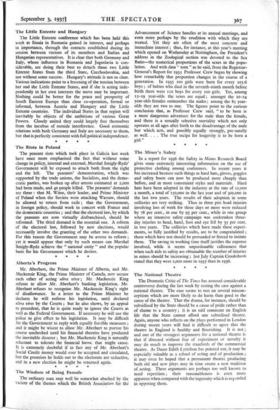The National Theatre The Dramatic Critic of The Times has
aroused considerable controversy during the last week by stating the case against a national theatre. The case seems to rest on several miscon- ceptions which are more likely to do harm than good to the cause of the theatre. That the drama, for instance, should be subsidised by the State should be a cause of pride rather than of shame to a country ; it is an odd comment on English life that the State cannot afford one subsidised theatre. Again, anyone who reflects on the plays performed in London during recent years will find it difficult to agree that the theatre in England is healthy and flourishing. It is not ; and one of the strongest arguments for a national theatre is that if directed without fear of experiment or novelty it may do much to improve the standards of the commercial theatre. As Dame Edith Lyttelton has pointed out, it may be especially valuable as a school of acting and of production ; it may even be hoped that a permanent theatre producing both old and new plays may in time create a new tradition of acting. These arguments are perhaps too well known to need repetition ; their reasonableness is even more apparent when compared with the ingenuity which is expended in opposing them.










































 Previous page
Previous page